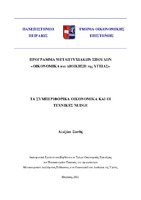Τα συμπεριφορικά οικονομικά και οι τεχνικές Nudge
Behavioural economics and Nudge theory

Προβολή/
Λέξεις κλειδιά
Συμπεριφορική επιστήμη ; Θεωρία της Ώθησης ; Λήψη αποφάσεων ; Τεχνικές NudgeΠερίληψη
Τα Συμπεριφορικά Οικονομικά τα οποία είναι ένας νέος κλάδος που συνδυάζει την
οικονομική επιστήμη με όρους και πειράματα κυρίως από την επιστήμη της ψυχολογίας
αποτελούν το θέμα της παρούσας διπλωματικής εργασίας. Πρόκειται για μια επιστήμη
που αντικείμενο μελέτης της είναι οι γνωστικές, κοινωνικές και συναισθηματικές
επιρροές στη συμπεριφορά των ανθρώπων με προσανατολισμό τις αγοραστικές
αποφάσεις που πολλές φορές μπορεί να είναι και ενάντια στις προτιμήσεις τους.
Η θεωρία της ώθησης χρησιμοποιείται στην ανάλυση του τρόπου σκέψης των
ανθρώπων και εξηγεί τις συμπεριφορές τους και ανάλογα με το τι θέλει να επιδιώξει, τις
καθορίζει, τις επηρεάζει και τις διαμορφώνει με σκοπό να καθοδηγήσει τον
καταναλωτή εκεί που επιθυμεί. Η ώθηση είναι μια διαδικασία που ανάλογα με τη χρήση
και το σκοπό της, μπορεί να θεωρείται άλλοτε αρνητική και άλλοτε θετική καθώς όπως
και οποιαδήποτε άλλη μέθοδος, έχει θετικές και αρνητικές πτυχές όσον αφορά τον
προσανατολισμό του καταναλωτή. Σκοπός λοιπόν, της παρούσας εργασίας είναι να
παρουσιαστεί εκτενώς ο τρόπος χρήσης της θεωρίας Nudge, ο στόχος της και τα
αποτελέσματα της από την εφαρμογή της τόσο στο ίδιο το άτομο όσο και στο
κοινωνικό σύνολο.
Η θεωρία αυτή εφαρμόζεται στην πράξη μέσα από διάφορες τεχνικές και τακτικές οι
οποίες είναι διαφορετικές μεταξύ τους ανάλογα με το πεδίο εφαρμογής τους. Για το
σκοπό αυτό, θα παρουσιαστούνε οι τεχνικές που χρησιμοποιούνται στο μάρκετινγκ
αλλά και στο ψηφιακό μάρκετινγκ, ωθώντας τους ανθρώπους μέσα από το διαδίκτυο
προς μια συγκεκριμένη κατεύθυνση και επιλογή. Ιδιαίτερη έμφαση θα δοθεί στις
τεχνικές Nudge όσον αφορά τη μεταβολή και διαμόρφωση της ανθρώπινης
συμπεριφοράς, επηρεάζοντας τη λήψη αποφάσεων των ανθρώπων. Επίσης,
παρουσιάζονται πολλά παραδείγματα σχετικά με την διαδικασία ανάπτυξης
αποτελεσματικών ωθήσεων μέσω των οποίων διαφαίνεται η ανάγκη του σχεδιασμού
μιας πιο γενικευμένης προσέγγισης με σκοπό την ανάπτυξη της ώθησης και την
διαμόρφωση ενός πλαισίου καθιστώντας πιο προσιτή τη διαδικασία της ώθησης.
x
Τέλος, θα σχολιαστεί η ώθηση ως ένα είδος χειραγώγησης των επιλογών και της
συμπεριφοράς των ανθρώπων. Η εναντίωση στη χρήση της ώθησης παρ’ όλα αυτά δεν
αποτελεί ουσιαστκό εμπόδιο για την λειτουργία της και η διαδικασία nudging τελικά
δεν διατηρεί το δικαιώμα της ελευθερίας επιλογών. Συνδυάζοντας την θεωρία της
ψυχολογικής διπλής διαδικασίας και το κριτήριο διαφάνειας του Thaler και Sunstein για
το αν το nudging είναι απαραίτητα για «χειραγώγηση» ή όχι, προκύπτει ένα πλαίσιο
τεσσάρων τύπων ωθήσεων το οποίο αποτελεί τη βάση των κατευθυντήριων γραμμών
για την υπεύθυνη χρήση της προσέγγισης nudge.

